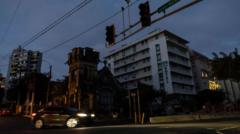In a grim start to the New Year, Puerto Rico was hit by a nearly island-wide blackout on New Year's Eve, affecting more than 1.2 million out of the approximately 1.5 million customers. Luma Energy, the primary power distributor for the island, has reported that the cause of the power outage is still under investigation, with full restoration of services expected to take between 24 to 48 hours.
This blackout has invigorated discussions about the persistent problems surrounding Puerto Rico's power infrastructure, which have lingered since the devastating impact of Hurricane Maria in 2017. By Tuesday afternoon, Luma Energy mentioned that power was restored to some areas, including the municipal hospital in San Juan, yet many residents continue to grapple with frustration over repeated outages.
Jenniffer González-Colon, Puerto Rico's current US congressional representative and incoming governor, took to X to express her concerns, emphasizing that the residents of Puerto Rico cannot tolerate a failing energy system. The economic and quality of life challenges posed by frequent blackouts were highlighted, underscoring the acute need for meaningful reform.
The current governor, Pedro Pierluisi, also demanded accountability from Luma and Genera, the two main power companies operating on the island. Last year alone, blackouts affected hundreds of thousands, with significant outages occurring in June and August during periods of extreme heat and after Hurricane Ernesto.
As Puerto Ricans continue to cope with blackouts, remarks from public figures reflect a growing impatience for change. Enid Núñez, a resident, poignantly noted the impact of outages on daily life, stating they have become an inescapable part of her routine.
The historical context of Puerto Rico's power issues reveals a grid that was troubled even before Hurricane Maria's destruction. Efforts to secure US government funding for recovery projects and infrastructure enhancements have been met with challenges, including construction delays and clearances from the Federal Emergency Management Agency (FEMA).
In a broader dialogue, Mark Levine, New York City's Manhattan borough president, expressed indignation over the ongoing plight faced by Puerto Ricans on social media, calling for greater support for the 3.5 million American citizens on the island. The collective sentiment highlights the urgent need for comprehensive energy reforms and effective crisis management as Puerto Rico continues to recover from past catastrophes.





















